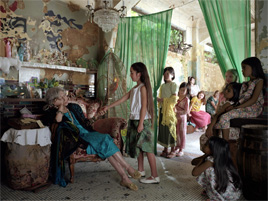 |
|
 |
| Miwa, 2001 © Miwa Yanagi, Collection of the Tokyo Metropolitan Museum of Photography |
|
Ai, 2003 © Miwa Yanagi,
Collection of the Hara Museum of Contemporary Art |
|
|
Part of the modern condition is a constant reassessment of positions. How do we locate our place within the world, society, and the family? Globally, how do we think about the environment or the development of technology into the future?
Almost ten years ago Miwa Yanagi began a project entwined with these questions, specifically for women, asking what kind of world they live in and what possible futures they foresee.
Yanagi's work focuses on women in society with a special interest in mass vs. individual mentality. In her 2000 photo work Elevator Girls, Yanagi depicted numerous young women dressed alike, going through repetitive gestures and confined to narrow quarters. During that time Yanagi felt that she and young Japanese women like her were "just playing a role in a standardized society" and the elevator girls helped explicate her sentiment. The series provided commentary on the (self-)repressive nature of imitation and group mentality. Visually, Elevator Girls employs Yanagi's characteristic digital enhancement of studio photographs, a technique that gives her works a polished if not artificial power.
Moving away from portrayal of the repetitive masses, Yanagi began focusing on individual women for her current series, My Grandmothers (2000-present). For Yanagi, young Japanese women feel the need "to be lovable and liked by everyone around them," and this limits their ability to express their desires or dreams. In My Grandmothers, young women are able to express ambitions and desires about themselves by imagining themselves fifty years in the future, thus detached from the restrictions of being a "young woman" today.
Using digital editing, Yanagi repaints the women as they might appear in their future -- wrinkled and old. Each work has an accompanying text and is named after the woman depicted.
This group of unique individuals lives out personal dreams -- flying airplanes for Misako or playing koto for Tsumugi -- yet there is more at work here than a simple realization of ambition. Misako's text reveals that she lives in a world whose environment has drastically changed, while for Tsumugi, approaching the end of her life necessarily produces a closeness to nature similar to that of Mitsue, who lies like a fallen leaf on the forest floor in her photo.
Works like Mika, Ai, Yoshie and Miwa express concerns about the women who will take over the world after their death and what their role is in nurturing the coming generation. Environmental concerns are expressed in post-apocalyptic worlds like that of Mie or through biotech modifications of the body, as in Kwanyi. Other works like Hyonee, Shizuka and Eriko depict women as independent and successful in their professional ambitions.
Women are also able to break contemporary sexual boundaries. One "grandma," Hiroko, lives in a world where sex work is no longer illegal but mainstream. And in Regine & Yoko a lesbian couple grows old together, tacitly advocating the normalization of open homosexuality.
Deliberately excluded are the common desire to grow old with a husband and grandkids, and women who don't think they will be alive in fifty years. This decidedly subjective view of the future of women nonetheless suggests liberating possibilities and raises pertinent if not commonly addressed issues.
|